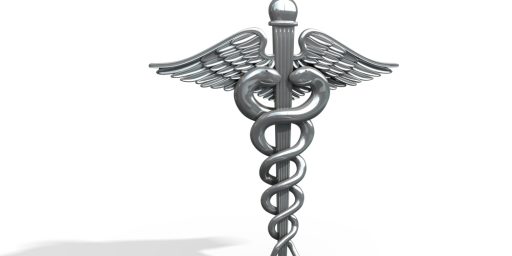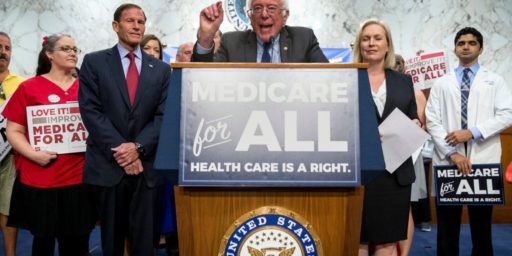America’s Health Care Caste System
Malcolm Gladwell argues that irrational reluctance to embrace nationalized health care has created a bizarre caste system.
THE MORAL-HAZARD MYTH (New Yorker)
People without health insurance have bad teeth because, if you’re paying for everything out of your own pocket, going to the dentist for a checkup seems like a luxury. It isn’t, of course. The loss of teeth makes eating fresh fruits and vegetables difficult, and a diet heavy in soft, processed foods exacerbates more serious health problems, like diabetes. The pain of tooth decay leads many people to use alcohol as a salve. And those struggling to get ahead in the job market quickly find that the unsightliness of bad teeth, and the self-consciousness that results, can become a major barrier. If your teeth are bad, you’re not going to get a job as a receptionist, say, or a cashier. You’re going to be put in the back somewhere, far from the public eye. What Loretta, Gina, and Daniel understand, the two authors tell us, is that bad teeth have come to be seen as a marker of “poor parenting, low educational achievement and slow or faulty intellectual development.†They are an outward marker of caste. “Almost every time we asked interviewees what their first priority would be if the president established universal health coverage tomorrow,†Sered and Fernandopulle write, “the immediate answer was ‘my teeth.’ â€
The U. S. health-care system, according to “Uninsured in America,†has created a group of people who increasingly look different from others and suffer in ways that others do not.
[…]
The death rate in any given year for someone without health insurance is twenty-five per cent higher than for someone with insur-ance. Because the uninsured are sicker than the rest of us, they can̢۪t get better jobs, and because they can̢۪t get better jobs they can̢۪t afford health insurance, and because they can̢۪t afford health insurance they get even sicker.
[…]
One of the great mysteries of political life in the United States is why Americans are so devoted to their health-care system. Six times in the past century—during the First World War, during the Depression, during the Truman and Johnson Administrations, in the Senate in the nineteen-seventies, and during the Clinton years—efforts have been made to introduce some kind of universal health insurance, and each time the efforts have been rejected. Instead, the United States has opted for a makeshift system of increasing complexity and dysfunction. Americans spend $5,267 per capita on health care every year, almost two and half times the industrialized world’s median of $2,193; the extra spending comes to hundreds of billions of dollars a year. What does that extra spending buy us? Americans have fewer doctors per capita than most Western countries. We go to the doctor less than people in other Western countries. We get admitted to the hospital less frequently than people in other Western countries. We are less satisfied with our health care than our counterparts in other countries. American life expectancy is lower than the Western average.
As has been oft noted, these comparative statistics are not entirely accurate. Our health care costs more partly because of a whole variety of things (government regulations, the tort system, the proliferation of “Lexus” tests and equipment, the relative dispersion of our people, and so forth) unrelated to the public/private argument. Because of relative deprivation, we may be less satisfied even with better care because we’re more aware of those getting even “better” care.
Still, Gladwell’s underlying argument has merit. Health care does not respond to the same market forces as, say, luxury goods. Demand is presumably somewhat elastic and there is almost certainly some degree of moral hazard involved but even routine medical care is sufficiently unpleasant that most people consume it only when sick.
Tyler Cowen points out, though, that single payer nationalized medicine is hardly a cure-all:
4. The U.S. health care system probably is the world’s best for some class of people, namely the well-off and I don’t mean just the super-rich. Trying to extend those benefits — however this might be accomplished — is a better approach than nationalizing the sector.
[…]
7. No one has a good plan for socializing American medical care or insurance.
8. Much European health comes from diet, walking, and tighter social networks of friends.
Matt Singer and Ezra Klein quote Gladwell approvingly, as does Kevin Drum, who adds,
Americans are bizarrely obsessed by stories about six-month waits for hip surgery in Canada, and thus have no clue that virtually every advanced country in the world has healthcare that’s better than ours, cheaper than ours, and covers more people than ours. All they can think about is that six month wait for hip replacements.
It depends on the percentages, no? Presumably, those who feel most strongly–and are thus more organized–about health care are those who are its most active consumers. That would be the elderly. And since the vast majority of Americans do in fact have health insurance and in fact do not have to wait six months for hip surgery, they’re not all that eager to move to a system wherein they would.
I’m not ideologically opposed to nationalizing health care if we can come up with a system that works. On the other hand, for most of us, the patchwork mess we have now isn’t that bad. It’s way more expensive than it needs to be but it’s incredibly flexible.
Surely, for $5,267 a person–hell, I’ll raise it to $7,000–we can come up with a system wherein the poor don’t have to wait for their teeth to rot out and the elderly don’t have to sit around in pain for six months if their hip breaks?






How do “tighter social networks of friends” contribute to better health?
(I’d click through to find out, but I’m puzzled—is there one post that the blockquote’s from?)
Oops–forget the link to Tyler. There now.
Presumably, this works the same way that being married is preferable to being single. More people to notice things wrong with you and nag you into going to see the doctor, eating better, etc. They’ll exercise with you, perhaps. And, if you keel over with a heart attack and you’re alone there’s nobody to call 911.
Considering how health care costs have soared under Bush, I think we should all be concerned about the uninsured and the possibility that we could be joining them.
I am sorry, many people have tried to make the case for socialized medicine in some form or another.
Malcolm connecting healthcare to bad teeth because of a lack fruits and veggies which then transends to alcohol usage, and ultimately not being able to get a job, is a bit far fetched.
In the end, I am not convinced that any plan, not even the current administration plan, is feasible or realistic as a solution. Primarily because it does not address the root cause.
Take Welfare for instance. A huge issue and problem. Truely providing and requiring welfare to be a bridge, would go a long way. Get people jobs that offer insurance and the whole cycle works in reverse. Thus preventing another generation of people without insurance.
Just my thoughts.
I HAVE health insurance, and am in the middle of a four-month wait to see a rheumatologist, while enduring crippling pain in the meantime which prevents me from exercising at all. Oh, and I’m 33, and employed in high-tech. And I’d pay all out-of-pocket to get in quicker, except you can’t. And I have one of those high-deductible health plans which is supposed to save us, except it sucks even worse, since you end up getting screwed on the payment and on the reimbursement out of ‘your account’ – it doesn’t work the way they claim. They SAY you’ll just pay the negotiated lower rate and get quickly reimbursed; but in reality you pay the FULL rate, you get reimbursed at the lower rate with your own money months later, and you often never get the doctor to pay back the difference.
For a libertarian’s view after living in France (hard to find ANYTHING good about our system even for a libertarian after seeing theirs), see: Matt Welch.